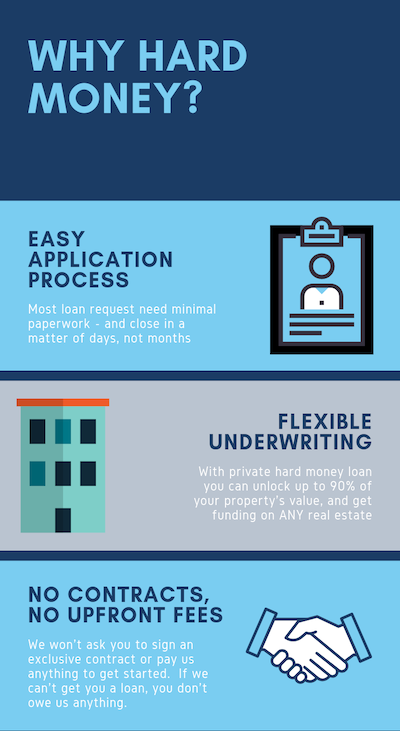When considering hard money loans, it is crucial to understand the potential upfront fees that may be involved. These types of loans are often sought after by real estate investors or individuals in need of quick financing, due to their unique characteristics and faster approval process. However, before deciding to proceed with a hard money loan, it is essential to be aware of any potential upfront fees that may incur, as they can impact the overall cost and viability of the loan.
Understanding Hard Money Loans
Definition of hard money loans
Hard money loans are a type of financing option typically used by real estate investors or individuals who cannot qualify for traditional bank loans. These loans are secured by the value of the property itself, rather than the borrower’s creditworthiness, making them an attractive option for those in need of quick funding or who have a poor credit history.
How hard money loans differ from traditional loans
Unlike traditional loans, which focus heavily on the borrower’s credit score and financial history, hard money loans primarily analyze the value of the property being used as collateral. Traditional loans often have a longer processing time, strict qualification criteria, and lower loan-to-value ratios. In contrast, hard money loans are usually approved quickly, have more flexible qualification requirements, and can have higher loan-to-value ratios.
Exploring Upfront Fees
What are upfront fees?
Upfront fees refer to the charges that borrowers must pay at the beginning of a loan application process. These fees cover various administrative and processing costs incurred by the lender, such as conducting property appraisals, underwriting the loan, and performing legal and title searches.
Common upfront fees in hard money loans
In hard money loans, some of the common upfront fees include loan origination fees, application fees, underwriting fees, processing fees, appraisal fees, title search fees, and legal fees. These fees can vary depending on the lender and the specific details of the loan.
Negotiating upfront fees
When considering a hard money loan, it’s important to understand that upfront fees are often negotiable. Lenders may have some flexibility in adjusting their fees based on factors such as the borrower’s financial situation, the value of the property, and the potential profitability of the loan. It is recommended that borrowers shop around and compare multiple loan offers to find the best terms and fees that suit their needs.

Loan Origination Fee
What is a loan origination fee?
A loan origination fee is a charge that lenders levy to cover the administrative costs of processing a loan application. It compensates the lender for tasks such as reviewing the borrower’s financial documents, assessing the property’s value, and preparing the necessary legal documentation.
Typical range of loan origination fees
Loan origination fees in hard money loans typically range from 1% to 5% of the loan amount. However, it is essential to note that these fees can vary depending on factors such as the lender’s guidelines, the complexity of the loan, and the borrower’s financial profile.
Factors that influence the loan origination fee
The loan origination fee can vary based on multiple factors, including the location of the property, the loan term, the borrower’s creditworthiness, and the amount of risk associated with the loan. Lenders may also consider the borrower’s experience in real estate investing and the potential profitability of the project when determining the loan origination fee.
Application Fee
Purpose of application fee
The application fee is charged to cover the costs involved in processing the loan application. This fee compensates the lender for tasks such as reviewing the borrower’s financial information, verifying employment and income, and assessing the feasibility of the project.
Average application fees in hard money loans
Application fees for hard money loans can range from $500 to $2,000, depending on the lender and the complexity of the loan. It is important for borrowers to review the loan agreement and ensure they understand the specific fees associated with the application.
How application fees are determined
Application fees are typically determined by the lender and can be influenced by factors such as the loan amount, the borrower’s financial history, the property type, and the lender’s internal policies. It is advisable for borrowers to inquire about the application fee before committing to a lender and to compare multiple loan offers to ensure they are getting a fair deal.

Underwriting Fee
Explanation of underwriting fee
The underwriting fee in a hard money loan is charged to compensate the lender for the time and resources expended in evaluating the loan application and assessing the risk associated with the borrower and the property.
Common underwriting fees in the industry
Underwriting fees for hard money loans can range from 1% to 3% of the loan amount, though some lenders may charge a flat fee. These fees can vary based on factors such as the complexity of the loan, the property type, and the lender’s operating costs.
Factors affecting the underwriting fee
The underwriting fee can be influenced by several factors, including the loan-to-value ratio, the borrower’s creditworthiness, the property’s location, and the experience of the borrower in real estate investments. Lenders consider these factors to assess the level of risk associated with the loan and determine the appropriate underwriting fee.
Processing Fee
Definition of processing fee
A processing fee is an upfront charge levied by the lender to cover the administrative costs related to processing and funding the loan. It compensates the lender for tasks such as verifying the borrower’s financial information, conducting property inspections, and coordinating with various parties involved in the loan process.
Range of processing fees for hard money loans
Processing fees for hard money loans typically range from 0.5% to 2% of the loan amount. However, it’s important to note that these fees can vary depending on the lender, the complexity of the loan, and the specific requirements of the borrower.
Determining factors for processing fees
The processing fee can vary based on factors such as the loan amount, the property type, the borrower’s financial history, and the lender’s internal policies. Lenders may also consider the time and resources required to complete the loan process when determining the processing fee.

Appraisal Fee
Purpose of an appraisal fee
The appraisal fee covers the cost of hiring a professional appraiser to evaluate the value of the property used as collateral for the hard money loan. This fee ensures that the lender has an accurate understanding of the property’s worth and can assess the loan-to-value ratio accurately.
Average appraisal fees in hard money loans
Appraisal fees for hard money loans typically range from $300 to $1,000, depending on factors such as the complexity of the property, its location, and the appraiser’s fees. It is essential for borrowers to understand the specific appraisal fee associated with their loan before proceeding with the application.
How appraisal fees are calculated
Appraisal fees are determined by various factors, including the size of the property, its location, its complexity, and the appraiser’s experience and fees. Lenders often engage professional appraisers to ensure an objective assessment of the property’s value, thereby determining the appropriate appraisal fee.
Title Search Fee
Meaning of title search fee
The title search fee is a charge levied by the lender to cover the costs associated with searching public records for information related to the legal ownership and any encumbrances on the property. It ensures that the lender has a clear and valid claim to the property as collateral.
Typical range of title search fees
Title search fees for hard money loans generally range from $200 to $500, depending on factors such as the location of the property, the complexity of the title search, and the fees charged by the professionals conducting the search.
Factors influencing the title search fee
The title search fee can be influenced by factors such as the property location, the complexity of the property’s ownership history, and the fees charged by the professionals conducting the search. It is important for borrowers to clarify the specific title search fee associated with their loan and include it in their overall cost assessment.

Legal Fee
Explanation of legal fee
The legal fee in a hard money loan covers the costs of hiring an attorney to review and prepare the necessary legal documents, such as the loan agreement, the promissory note, and the mortgage or deed of trust. This fee ensures that the loan is legally binding and protects the interests of both the lender and the borrower.
Common legal fees in hard money loans
Legal fees for hard money loans can range from 1% to 3% of the loan amount, depending on factors such as the complexity of the loan, the amount of legal work required, and the fees charged by the attorney. Some lenders might charge a flat fee instead.
How the legal fee is determined
The legal fee can be determined based on factors such as the loan amount, the property type, the borrower’s legal requirements, and the specific terms and conditions of the loan. Lenders often have established relationships with attorneys or law firms and negotiate the legal fee on behalf of the borrower.
Additional Fees to Consider
Other potential fees involved
In addition to the upfront fees discussed above, borrowers must also consider other potential fees involved in hard money loans. These may include fees for document preparation, wire transfer fees, due diligence fees, loan servicing fees, and prepayment penalties. It is essential for borrowers to review and understand the loan agreement to identify any additional fees that may apply.
Miscellaneous costs in hard money loans
Apart from the upfront and potential additional fees, borrowers should also consider miscellaneous costs associated with hard money loans. These costs may include insurance premiums, property taxes, and ongoing maintenance expenses. Properly assessing and accounting for these costs is crucial for borrowers to make informed financial decisions.
In conclusion, hard money loans can provide a valuable financing option for individuals who need quick funding or cannot qualify for traditional bank loans. However, it is important for borrowers to understand the various upfront fees associated with these loans, as they can significantly impact the overall cost of borrowing. By comprehending the purpose, typical ranges, and factors influencing these fees, borrowers can make informed decisions and negotiate the best terms that align with their specific financial needs.




